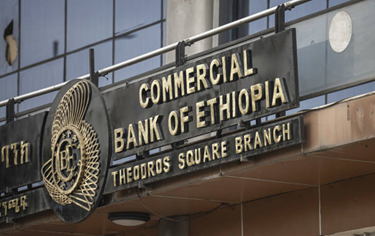
Ethiopia has recently embarked on a transformative journey towards modernizing its financial infrastructure, striving to create a digitally empowered financial ecosystem. Central to this transformation is the recent collaboration between the Commercial Bank of Ethiopia (CBE) and MasterCard, which culminated in the launch of a cutting-edge MasterCard payment system. This initiative represents not merely a technological upgrade but a fundamental shift in the way financial transactions are conducted in the country, promising to enhance accessibility, security, and efficiency.
According to the information obtained from National Bank of Ethiopia still 85 percent of the population is unbanked because of various reasons including lack of disposable income, absence of saving culture and the unavailability of financial infrastructure hence, digitizing the sector is expected to alleviate infrastructural gap.
Abe Sano, President of CBE, articulated the vision behind this partnership during the official launch, emphasizing its role in aligning the bank’s services with international standards. With the integration of MasterCard’s technology, CBE aims to facilitate seamless transactions for both domestic and international users. This initiative is particularly salient in the context of Ethiopia’s ambition to transition to a cashless economy—a goal that resonates with global trends and reflects a growing recognition of the importance of digital financial solutions.
Currently the nation’s status in terms of digitization lags behind other Sub Saharan countries and neighboring countries such as Kenya. These clearly proved that advancing digitization is timely and working with partners is valid.
The collaboration with MasterCard is not a mere business arrangement; it exemplifies a commitment to fostering financial inclusion across the continent.
Mark Elliot, President of MasterCard Africa, echoed this sentiment, underscoring the company’s dedication to supporting the increasing demand for modern, secure payment infrastructure in Ethiopia. The partnership signifies recognition of the unique challenges faced by the Ethiopian banking sector and a willingness to address them through innovative solutions.
Ethiopia has 31 commercial banks and 17 insurance companies that are very scanty for the populous country with more than 130 million. This implies that expanding financial institutions is demanding. Digitization should be an integral part of the expansion works. In this regard, the Commercial Bank of Ethiopia (CBE) plays a pioneering role in reaching customers with its diverse branches.
The relationship between CBE and MasterCard is rooted in a history of collaborative efforts aimed at enhancing the financial landscape in Ethiopia. While this recent launch marks a significant milestone in their partnership, it is worth noting that both institutions have previously worked together on various initiatives within the financial sector. These past collaborations have laid the groundwork for the current endeavor, fostering mutual understanding and a shared vision for the future.
Historically, Ethiopia’s banking sector has been characterized by limited access to international financial networks and a reliance on cash-based transactions.
In the imperial era the private financial sectors together with the CBE had been flourishing. The emergence of self-sustained private sector had stimulated the economy while manufacturing and modern farming boomed taking advantage of the opportunities offered by the financial sector. Export also grew up further raising the nation’s foreign currency earnings. The flow of foreign investment was promising. However, the progresses regressed following the nationalization of private firms including banks after the downfall of the imperial regime.
This has posed considerable challenges for individuals and businesses alike, stifling economic growth and hampering financial inclusion.
Two decades later the financial sector has been liberalized. The involvement of private sector in the banking and insurance has been resurrected. New rules and regulations, which abolished the cumbersome proclamation, lifted up trust between investors and the government reinvigorated. The expansion of physical infrastructures and the enabling environment revitalized the economy from recess. Currently Ethiopia has been preferable investment destiny in the horn of Africa. The introduction of the MasterCard payment system is poised to address some infrastructural challenges head-on, enhancing the overall efficiency of financial transactions and expanding access to banking services.
The newly implemented MasterCard payment system is expected to play a pivotal role in advancing digital payment services throughout Ethiopia. According to CBE, the system will provide customers with access to secure, convenient, and globally recognized electronic payment solutions. This includes the ability to conduct international transactions—an area that has historically faced significant limitations within the Ethiopian banking landscape.
In a country where cash transactions have predominated, the introduction of a reliable digital payment system represents a revolutionary shift. It not only empowers consumers by providing them with more choices but also facilitates greater transparency in financial dealings. For businesses, the ability to accept electronic payments can lead to increased sales and a broader customer base, ultimately contributing to economic growth.
According to the Financial Consultant Zemedeneh Nigatu, Financial inclusion is a critical issue in Ethiopia, where a substantial portion of the population remains unbanked or under banked. Traditional banking methods have often excluded marginalized communities, exacerbating economic disparities. The introduction of the MasterCard payment system is a crucial step toward bridging this gap, as it promises to democratize access to financial services.
Technological advancements are central to this endeavor. By leveraging MasterCard’s sophisticated payment technology, CBE can offer a range of services that cater to the diverse needs of its customers. For instance, mobile payment solutions and digital wallets can enable individuals without access to traditional banking infrastructure to engage in financial transactions. This not only empowers individuals but also fosters a more inclusive economy.
While the launch of the MasterCard payment system heralds a new era for Ethiopia’s financial sector, it is essential to acknowledge the challenges that lie ahead. The successful implementation of digital payment systems requires robust infrastructure, including reliable internet connectivity and cyber security measures. In many rural areas of Ethiopia, access to the internet remains limited, potentially hindering the widespread adoption of digital payment solutions.
Moreover, there is a need for comprehensive financial literacy programs to ensure that users understand how to navigate these new systems effectively. Without adequate education and support, the potential benefits of digital payments may not be fully realized. Therefore, it is imperative that CBE and its partners prioritize initiatives aimed at enhancing financial literacy among the population.
The partnership between CBE and MasterCard represents a significant step toward realizing a digitally empowered financial ecosystem in Ethiopia. By modernizing payment systems and promoting financial inclusion, this initiative has the potential to transform the lives of millions. The leaders of both institutions have expressed a shared vision for the future—one where technology serves as a catalyst for economic empowerment and social progress.
As Ethiopia continues to navigate the complexities of digital transformation, it is crucial to remain vigilant in addressing the challenges that arise. The commitment to fostering an inclusive financial ecosystem must be accompanied by ongoing efforts to enhance infrastructure, improve financial literacy, and ensure the security of digital transactions.
The launch of the MasterCard payment system by the Commercial Bank of Ethiopia marks a pivotal moment in the country’s journey toward a digitally empowered financial ecosystem. This partnership not only enhances the bank’s service offerings but also signifies a broader commitment to financial inclusion and economic growth. As Ethiopia embraces the opportunities presented by digital technology, the potential for transformation is immense.
Currently the number of graduates in the fields of digitization and financial market has been growing from time to time. The sector also plays pivotal role in absorbing labor supplied to the market and such ventures dictate the nation’s aspiration to build digitized economy by 2030.
By prioritizing accessibility, security, and education, the nation can pave the way for a more inclusive and prosperous financial future, ensuring that all citizens can participate fully in the economy.
BY ABEBE WOLDEGIORGIS
THE ETHIOPIAN HERALD THURSDAY 17 APRIL 2025





